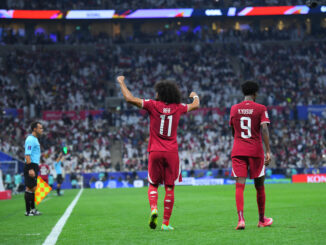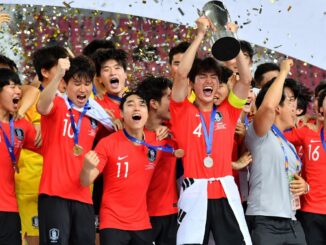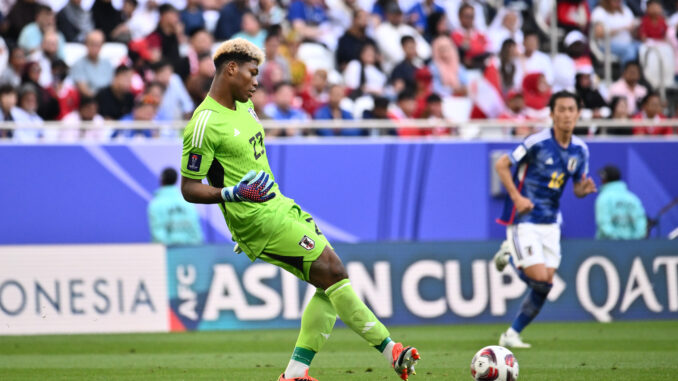
What started as a question mark heading into the tournament, grew firstly into a dilemma and is now a full-blown problem that could have a major say in how far Japan progress at the AFC Asian Cup.
For a squad stacked with quality in midfield and a blend of promising talents and experienced heads across the backline, the issues were always likely to come at either end of the pitch.
Having not started the opening two games, Ayase Ueda has helped ease the concerns up front but in goal the problems are real and deep.
At fault for at least one of Vietnam’s two goals in their opening match, again the first in an upset 2-1 defeat against Iraq, then spilling an effort at his near post to allow Indonesia to score and following that with a mix-up that allowed Bahrain to strike in the Round of 16, it’s been a calamitous tournament for Zion Suzuki in the Japan goal.
With each match and each compounding error there’s a sense that the young keeper’s confidence and perhaps just as importantly those of his teammates in him, is waning.
Having to deal with reported online abuse midway through the tournament obviously hasn’t helped things either, but so serious is the 21-year-old’s complete form collapse that Japan coach Hajime Moriyasu has to give serious thought to making a change.
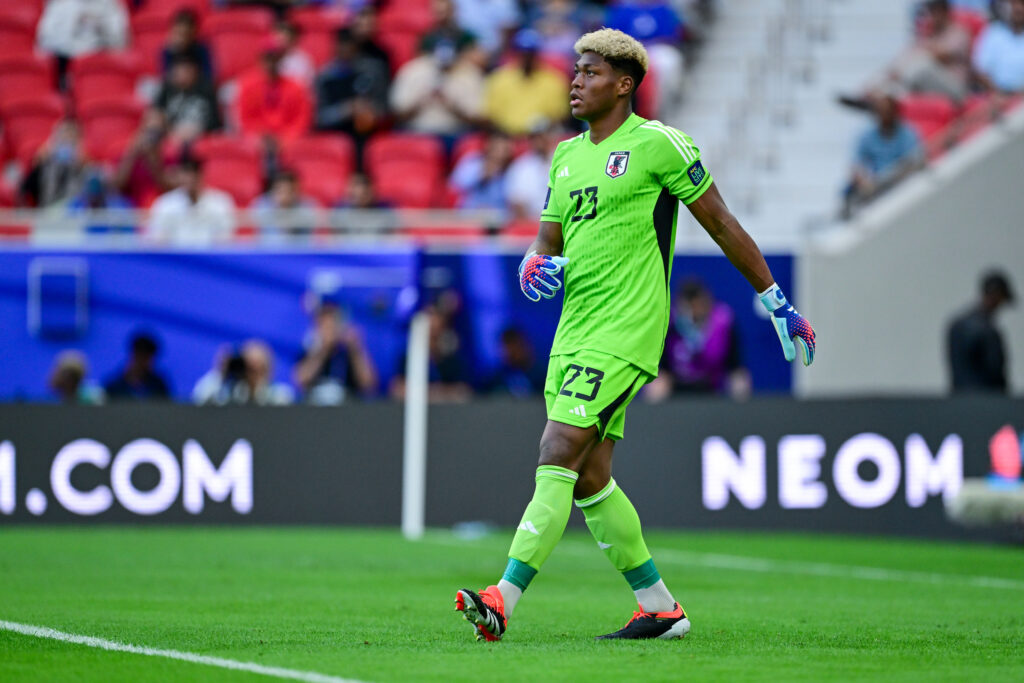
As we’ve seen throughout the knockout stages, it’s moments that decide these close fixtures and if Japan continue to stick with a keeper so badly out of form, then chances of those mistakes costing Japan not points but rather their place in the competition continues to grow.
The issue of how to deal with it comes with two considerations though, the first being Moriyasu’s fairly stubborn approach of sticking with those who earned his trust initially, and on that front it’s hard to see the veteran coach making a switch at this point of the tournament given that he’s shown faith in Suzuki after each worrying performance.
The second concern is whether or not the replacements are up to the level of a nation that’s aiming to win the continental championships.
As impressive as he was in helping Vissel Kobe win the J.League last season, Daiya Maekawa, at 29, has just one international appearance (and that came last year) while Taishi Brandon Nozawa is uncapped and has never been a first choice option in Japan’s top flight.
Suzuki himself had just four senior caps to his name heading into the Asian Cup and had never been more than a backup at J1 level prior to his European move six months ago.
Given the extent of the problem between the sticks it’s surprising that there hasn’t been more scrutiny of Moriyasu’s decision to roll the dice at the back.
Bringing an Olympic-age keeper in with crucial qualifiers for the Paris Games coming in two months makes sense, bringing two didn’t and now Japan faces the twin issues of their new first choice senior option, doubling as the Olympic keeper, being woefully out of form.
Pre-tournament injuries to Keisuke Osako and Keisuke Nakamura didn’t help the cause but to enter a major international tournament with two keepers who’ve played a combined half a year of top flight club football and a 29-year-old with one cap and a mixed domestic career is starting to look more bizarre by the game.
While, for the most part, Suzuki’s distribution and shot-stopping have been passable, his decision making, positioning, handling errors and lack of a commanding presence in the box are hurting Japan game after game.
For me, hands down, Japan’s best goalkeeper is Sagan Tosu’s Park Il-gyu, but at 34 (and only recently having received his Japanese passport) he’s hardly one for the future although he would have provided a calming, steady presence and a comfort with the ball at his feet that the three keepers in this squad don’t possess.
The strangest omission, however, is the second best domestic keeper, Niigata’s Ryosuke Kojima, who, having only recently turned 27, very much has the look of being Japan’s long-term number one.
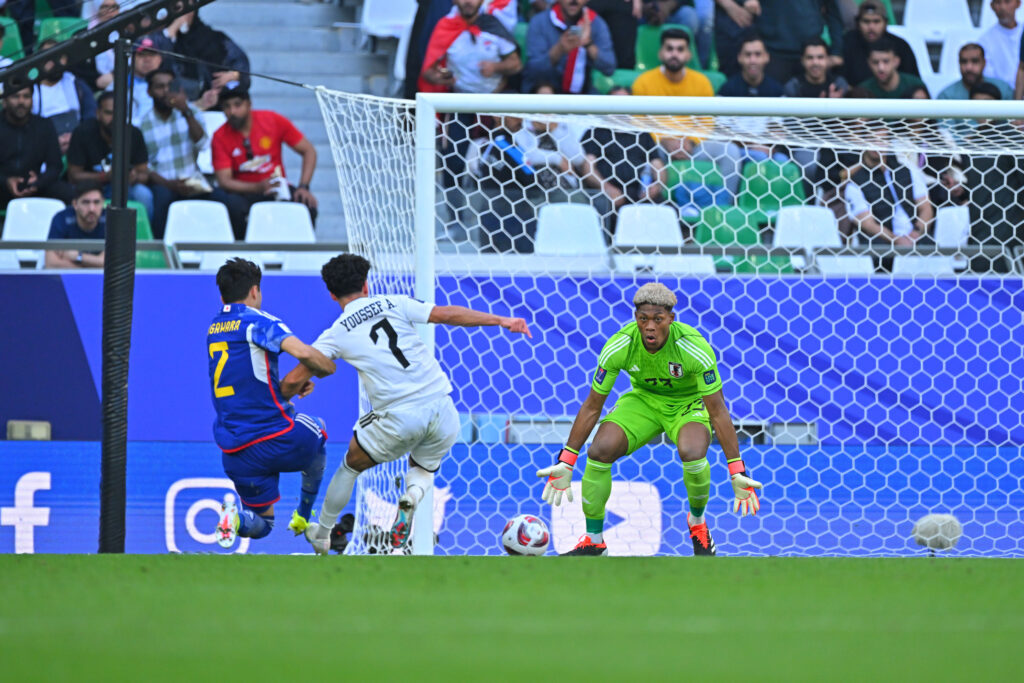
A mainstay in the national youth teams in his younger days, Kojima too is comfortable with the ball at his feet as well as being a fine shot-stopper but he’s hardly had a look-in under Moriyasu and remains uncapped at senior level.
Attention now turns to whether an unlikely change will be made for the quarter-final match with Iran or otherwise just how Moriyasu and his staff have been able to patch up Suzuki’s leaking confidence.
The next three matches could see the nation face the likes of Sardar Azmoun, Akram Afif and Son Heung-min and they’re a step up in quality from the players that the Japanese keeper has struggled with so far.
There comes a point where, if Moriyasu feels that Suzuki is Japan’s long-term number one, he needs to shield him from further mistakes at this point of his career and the risk of permanently burning his confidence, rather than continuing to throw him to the wolves as the heat intensifies.
That point is very close to arriving.
Photos: Asian Football Confederation
Listen to The Asian Game Podcast with ESPN’s Joey Lynch from the Al Janoub Stadium


